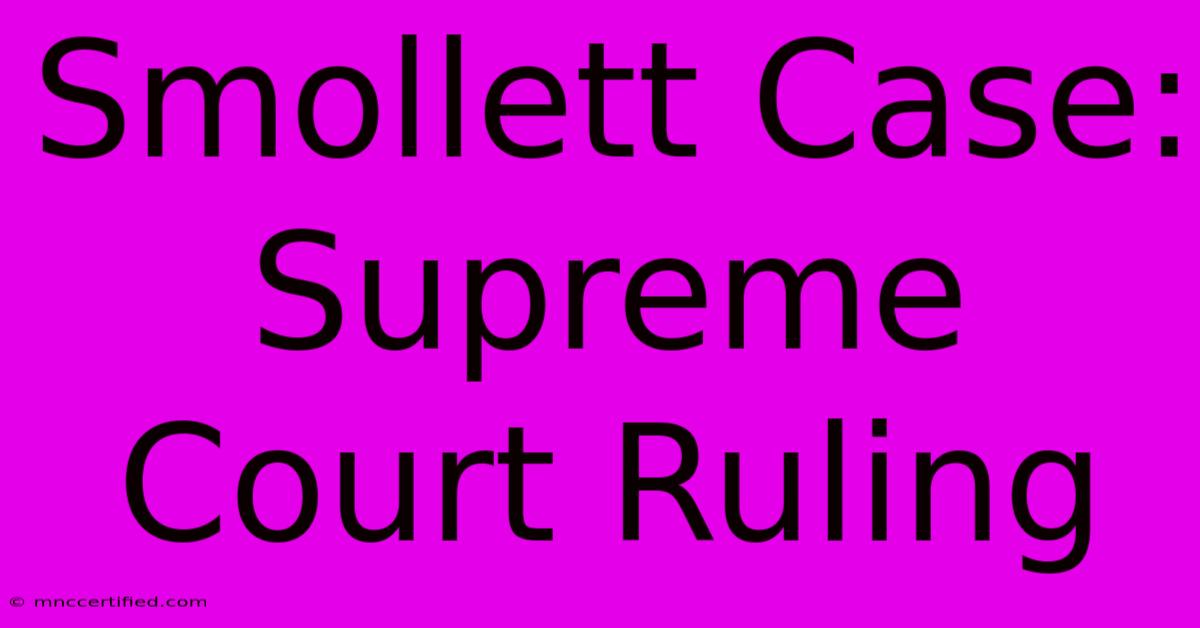Smollett Case: Supreme Court Ruling

Table of Contents
Smollett Case: Supreme Court Ruling and its Implications
The Supreme Court's decision in the Jussie Smollett case has sent ripples throughout the legal and media landscapes. This case, involving the actor's claims of a hate crime hoax, has become a significant landmark, raising crucial questions about prosecutorial power, false reporting laws, and the balance between free speech and public safety. This article delves into the Supreme Court's ruling, its implications, and the broader context of the case.
Understanding the Smollett Case Background
Jussie Smollett, a former actor on the television show Empire, claimed in 2019 to have been the victim of a hate crime. He alleged that two masked men attacked him, shouting racial and homophobic slurs. However, investigations revealed that Smollett had orchestrated the entire event. He was subsequently charged with disorderly conduct for filing a false police report.
Initially, Smollett was charged in a Cook County, Illinois court. The charges were later dropped, a decision that sparked significant public outrage and criticism. This led to a special prosecutor being appointed to re-examine the case, resulting in Smollett's eventual conviction on six counts of disorderly conduct. The conviction was later appealed, eventually reaching the Supreme Court.
The Supreme Court's Ruling: A Focus on Prosecutorial Discretion
The Supreme Court's ruling in the Smollett case didn't directly address the guilt or innocence of Smollett himself. Instead, the central issue before the court revolved around the prosecutorial discretion involved in the initial dropping of charges. The justices focused on the procedural aspects of the case and the power of prosecutors to dismiss charges, even after an indictment. The ruling emphasized the importance of maintaining a balance between the need for efficient and fair prosecution and the potential for abuse of power.
While the specific details of the Supreme Court's reasoning are complex, the key takeaway is a reaffirmation of the broad discretion afforded to prosecutors in managing their caseloads. This decision underscores the inherent authority of prosecutors to decide whether to pursue charges, dismiss them, or even negotiate plea bargains. However, this power is not absolute and is subject to legal and ethical constraints.
Key Implications of the Ruling:
-
Prosecutorial Accountability: The ruling implicitly underscores the need for transparency and accountability in prosecutorial decision-making. While prosecutors have broad discretion, their actions should be justifiable and not appear arbitrary or motivated by improper influences.
-
Impact on False Reporting Laws: The case highlights the importance of laws prohibiting false reporting to law enforcement. The Smollett case served as a stark reminder of the consequences of making false claims, particularly those that consume significant police resources and potentially undermine public trust.
-
First Amendment Considerations: The case did not directly challenge First Amendment rights, focusing instead on the procedural aspects of the prosecution. However, the broader conversation surrounding the case touches upon the limits of free speech when it involves deliberately false statements that harm public safety.
The Broader Context and Future Implications
The Smollett case transcended a simple criminal prosecution. It became a highly publicized and politically charged event, highlighting deep divisions within society. The Supreme Court's ruling, though primarily procedural, adds another layer to this complex narrative.
The ruling’s impact will likely be felt in future cases involving prosecutorial discretion and the handling of charges related to false reporting. It's crucial to remember that this decision doesn't set a precedent for overturning convictions based on similar facts; it focused specifically on the process and the limits of prosecutorial power.
Conclusion: Balancing Justice and Discretion
The Smollett case, and the Supreme Court's subsequent ruling, serve as a crucial reminder of the delicate balance between prosecutorial discretion and the need for a fair and just legal system. The case continues to generate debate, highlighting the importance of transparency, accountability, and a careful consideration of the implications of prosecutorial decisions. The impact of this decision will likely be felt for years to come, shaping discussions surrounding prosecutorial power, false reporting laws, and the pursuit of justice.

Thank you for visiting our website wich cover about Smollett Case: Supreme Court Ruling. We hope the information provided has been useful to you. Feel free to contact us if you have any questions or need further assistance. See you next time and dont miss to bookmark.
Featured Posts
-
Ken Reid Death Brings Family Comfort
Nov 22, 2024
-
Ucl Women S Arsenal Man City Match Updates
Nov 22, 2024
-
Erie Insurance Kings Mountain Nc
Nov 22, 2024
-
Homeowners Insurance Garage Door
Nov 22, 2024
-
Teen Sex Case Briton In Dubai
Nov 22, 2024